At the 135th Anniversary Gala, we honored the five newest members of the University of Maryland School of Nursing’s prestigious group of Visionary Pioneers, alumni who have made a significant impact on and contribution to the field of nursing based on their leadership, innovation, or entrepreneurship. They join our 30 other Visionary Pioneers, selected during the School’s 125th and 130th anniversary celebrations. Every five years, an additional five Visionary Pioneers are named to this esteemed group.
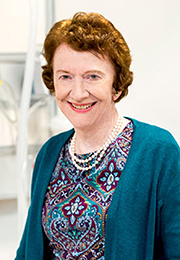 Ann Wolbert Burgess, DNSc, MS ’59, RNCS, FAAN, is a pioneer in forensic and psychiatric nursing. She has profoundly shaped the understanding and treatment of trauma survivors. An internationally recognized expert, her career has centered on the psychological impact of violence, especially among crime victims, children, and the elderly. Her early work, co-founding one of the first hospital-based crisis counseling programs in Boston, laid the foundation for decades of groundbreaking contributions to mental health and forensic science.
Ann Wolbert Burgess, DNSc, MS ’59, RNCS, FAAN, is a pioneer in forensic and psychiatric nursing. She has profoundly shaped the understanding and treatment of trauma survivors. An internationally recognized expert, her career has centered on the psychological impact of violence, especially among crime victims, children, and the elderly. Her early work, co-founding one of the first hospital-based crisis counseling programs in Boston, laid the foundation for decades of groundbreaking contributions to mental health and forensic science.
Dr. Burgess collaborated with the FBI to study serial offenders, linking child abuse and juvenile delinquency to future perpetration. Her research expanded to include the traumatic effects of cyberstalking, internet sex crimes, and elder abuse. She has authored numerous scholarly articles and books, including the acclaimed memoir, “A Killer by Design: Murderers, Mindhunters, and My Quest to Decipher the Criminal Mind.” Known for her influential courtroom testimony and described as a “nursing pathfinder,” Dr. Burgess continues to teach forensic science and mental health at Boston College. She was the 2020 speaker at UMSON’s Ann Ottney Cain Lecture in Psychiatric Nursing, when she presented “Shattering Silence: Clinical Perspectives on Sexual Violence 1970 - 2020.”
Her accolades include induction into the Sigma International Nurse Researcher Hall of Fame; the American Nurses Association Hildegard Peplau Award; and the American Academy of Nursing’s highest honor, Living Legend. She has also received numerous honorary degrees and leadership awards recognizing her lifelong dedication to victim advocacy and interdisciplinary research.
Dr. Burgess earned her Bachelor of Science in Nursing and Doctor of Nursing Science degrees from Boston University and her Master of Science degree from UMSON.
Dr. Burgess’ career stands as a powerful testament to the role of nurses in shaping justice, mental health, and public understanding of trauma. Her work has saved lives, changed systems, and inspired generations of nurses, researchers, and investigators to see beyond symptoms to the human stories behind them.
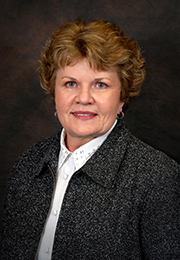
Wanona “Winnie” Fritz, EdD, MS ’78, NEA-BC, has dedicated her career to transforming health care systems on a global scale. From Vietnam War field hospitals to boardrooms in 24 countries, she has led with vision, agility, and compassion, improving care delivery, strengthening leadership, and building health systems that serve both people and purpose.
As chief operating officer and senior vice president of operations and clinical services at HCCA International, Dr. Fritz directs organizational turnarounds, hospital redesigns, and workforce development initiatives across the globe. Her work has most recently taken her to Africa, Turkey, the Caribbean, the United Kingdom, and the Middle East, and she continues to lead efforts in health care innovation and systems optimization in both international and U.S. settings. She also serves on four U.S. boards spanning health care, real estate, safety, nursing education, and international workforce recruitment.
Her career includes C-suite roles in hospitals in Las Vegas; Milwaukee; and Phoenix, Nogales, and Tucson in Arizona, where she served as CEO of Ascension Carondelet St. Mary’s and Holy Cross hospitals and led strategic initiatives in telehealth, supply chain, and centers of excellence. She spent 17 years under the patronage of His Majesty King Hussein of Jordan, assessing health care for nomadic communities, serving as dean of a nursing school, and later helping overhaul the country’s hospital network. For these efforts, she was awarded the Royal Medal of Honor.
A decorated Army nurse and Vietnam veteran, Fritz earned her pilot’s wings and the Bronze Star while serving in combat and humanitarian care units. She has taught at Georgetown University in Washington, D.C.; the University of Maryland School of Nursing; and other institutions; led global consulting efforts; and developed models of care for military, veteran, and senior populations. She continues to advise on international recruitment, nursing competencies, and veteran services, and she volunteers as a classroom teacher focused on the Middle East and military history.
Known for her ability to cut through complexity, empower front-line voices, and build sustainable systems of care, Dr. Fritz embodies what it means to be a global nurse leader. Her legacy is one of extraordinary service, strategic vision, and an unwavering belief in the power of health care to uplift communities around the world.
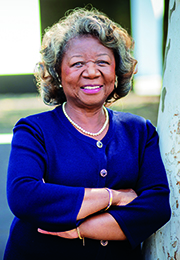
Taylor Harden, PhD, MS ’77, BSN ’72, FGSA, FAAN, is a nationally recognized expert in gerontological nursing, minority health, and research administration, whose career reflects a deep commitment to public service, inclusion, and advancing the science of aging. A two-time graduate of UMSON, Harden began her career in military and Veterans Administration health settings before becoming one of the first to serve as a flight nurse in the U.S. Air Force Active Reserve. Her experiences at bases across the country laid the groundwork for her future in health policy and research leadership.
Dr. Harden’s landmark contributions at the National Institute on Aging, where she served for 14 years, including as acting deputy director, transformed how aging research addresses equity, diversity, and career development. She was instrumental in creating and expanding initiatives such as the Butler-Williams Scholars Program, Resource Centers for Minority Aging Research, and the Women of Color Research Network. Her influence also extended to major National Institutes of Health studies, including the Study of Women’s Health Across the Nation, and she authored the long-standing MSTEM Advancing Diversity in Aging Research funding mechanism.
As executive director of the John A. Hartford Foundation’s Building Academic Geriatric Nursing Capacity program, Dr. Harden helped launch the careers of nearly 300 nurse scholars and faculty, shaping the next generation of gerontological leaders. She is a Distinguished Educator with the National Hartford Center of Gerontological Nursing Excellence and continues her mentorship through the Betty Irene Moore Fellowship.
Her many honors include fellowship in the American Academy of Nursing, Gerontological Society of America, and New York Academy of Medicine. In 2021, she received UMSON’s Distinguished Alumni Award. Dr. Harden’s leadership has not only influenced national research priorities but has also expanded opportunities for historically underrepresented scholars in aging. Her motto, “Strong Deeds, Gentle Words,” continues to guide her enduring contributions to nursing and public service.
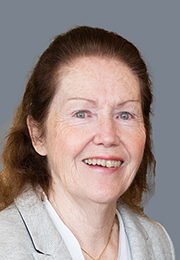
Mary Etta C. Mills, ScD, MS ’73, BSN ’71, RN, NEA-BC, FAAN, has been at the forefront of nursing informatics and health systems leadership for more than four decades. A visionary academician and administrator, she transformed how nurses use technology to enhance care and lead change in complex organizations. As an UMSON alumna and former faculty member, her influence has shaped both the School and the global nursing community. She has spent decades transforming the intersection of clinical practice, technology, and organizational systems to improve outcomes for patients and providers alike.
Dr. Mills held numerous leadership roles at UMSON, including professor in the Department of Organizational Systems and Adult Health and associate dean for academic affairs. She also served as vice president for nursing at the University of Maryland Medical Center, where she helped lead clinical and operational transformation. Widely considered one of the founding architects of nursing informatics, she led the development of the world’s first master’s (1988) and doctoral (1991) programs in that field at UMSON, cementing the School’s status as an informatics pioneer.
Her research, publications, and leadership have significantly advanced interdisciplinary understanding of how integrated information systems can drive clinical decision-making, improve quality of care, and reduce harm. With more than $10.5 million in research and training grants, she led strategic academic-service partnerships that elevated nurse leadership and fostered systems innovation. Dr. Mills has authored more than 100 peer-reviewed articles, four books, and countless presentations that have shaped global conversations about nursing education and practice.
Dr. Mills’ contributions have extended internationally, as she has provided educational direction in Canadian, Saudi Arabian, Taiwanese, and Pan American health systems. She has chaired more than 40 PhD dissertations and mentored generations of nurse leaders and informaticists. Her work has elevated nursing’s role in shaping data-driven, patient-centered, and technologically integrated health care systems.
Dr. Mills earned her Bachelor of Science in Nursing and Master of Science at UMSON before completing her ScD in Health Services Administration and Behavioral Sciences at Johns Hopkins University.
A fellow of the American Academy of Nursing and recipient of UMSON’s 2020 Distinguished Alumni Award, Dr. Mills’ visionary leadership continues to resonate across academia, clinical care, and global health systems.
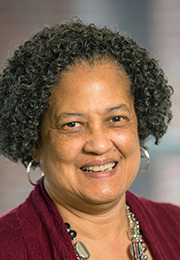
Shielda Rodgers, PhD ’92, MS ’83, RN, has championed equity and inclusion in nursing education for more than 40 years, building environments where students from all backgrounds feel seen, supported, and empowered to succeed. Her work as a faculty member, mentor, and academic leader has transformed not only individual lives but institutional culture.
A two-time UMSON graduate, Dr. Rodgers is a professor and associate dean for collective well-being at the University of North Carolina (UNC) at Chapel Hill School of Nursing. Rodgers began her career as a nurse and educator before focusing on the academic and emotional success of underrepresented students. In the 1980s, she was already identifying bias-related barriers and building culturally responsive support systems for nursing students from historically underrepresented populations on predominantly white campuses. Her work laid the foundation for inclusive frameworks that are now national models in higher education.
At UNC, she has led major institutional efforts to advance belonging, cultural competence, and holistic admissions practices. As project director for a $1.9 million Health Resources and Services Administration grant, she developed the MENTORS program to strengthen peer and faculty support systems, ultimately increasing diversity in the nursing workforce. Her leadership has shaped national policy conversations, informed American Association of Colleges of Nursing initiatives, and supported faculty in integrating cultural sensitivity into the classroom and clinical settings.
Dr. Rodgers is also a deeply beloved mentor. Student testimonials speak of her as a guiding light and tireless advocate who changes lives both personally and professionally. She is a Living Legend honoree of Chi Eta Phi Nursing Sorority and a recipient of numerous awards for excellence in teaching, advising, and service. Her office is a known haven for support, reflection, and action.
Dr. Rodgers’ legacy lies in her ability to connect systemic change with personal care. Through decades of mentorship, advocacy, and innovation, she has shaped more equitable and compassionate learning environments and left an indelible mark on generations of nursing students and educators. She is, in every sense, a visionary pioneer in building inclusive and healing academic communities.

 Ann Wolbert Burgess, DNSc, MS ’59, RNCS, FAAN, is a pioneer in forensic and psychiatric nursing. She has profoundly shaped the understanding and treatment of trauma survivors. An internationally recognized expert, her career has centered on the psychological impact of violence, especially among crime victims, children, and the elderly. Her early work, co-founding one of the first hospital-based crisis counseling programs in Boston, laid the foundation for decades of groundbreaking contributions to mental health and forensic science.
Ann Wolbert Burgess, DNSc, MS ’59, RNCS, FAAN, is a pioneer in forensic and psychiatric nursing. She has profoundly shaped the understanding and treatment of trauma survivors. An internationally recognized expert, her career has centered on the psychological impact of violence, especially among crime victims, children, and the elderly. Her early work, co-founding one of the first hospital-based crisis counseling programs in Boston, laid the foundation for decades of groundbreaking contributions to mental health and forensic science.


